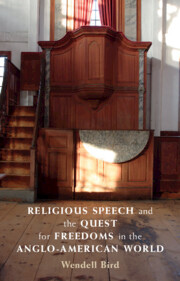Book contents
- Religious Speech and the Quest for Freedoms in the Anglo-American World
- Reviews
- Religious Speech and the Quest for Freedoms in the Anglo-American World
- Copyright page
- Dedication
- Contents
- Figures
- Abbreviations
- Introduction
- 1 The Legacy of Freedom of Speech
- 2 The Legacy of Freedom of Press
- 3 The Legacy of Freedoms for the Criminally Accused
- 4 The Legacy of Higher Education
- 5 The Legacy of Abolition of Slavery
- 6 The Legacy of the Modern Civil Rights Movement
- Epilogue
- Acknowledgments
- Select Bibliography
- Index
6 - The Legacy of the Modern Civil Rights Movement
Published online by Cambridge University Press: 13 April 2023
- Religious Speech and the Quest for Freedoms in the Anglo-American World
- Reviews
- Religious Speech and the Quest for Freedoms in the Anglo-American World
- Copyright page
- Dedication
- Contents
- Figures
- Abbreviations
- Introduction
- 1 The Legacy of Freedom of Speech
- 2 The Legacy of Freedom of Press
- 3 The Legacy of Freedoms for the Criminally Accused
- 4 The Legacy of Higher Education
- 5 The Legacy of Abolition of Slavery
- 6 The Legacy of the Modern Civil Rights Movement
- Epilogue
- Acknowledgments
- Select Bibliography
- Index
Summary
The modern civil rights movement in America was directed and sustained by ministers and churches fervently proclaiming Judeo-Christian religious beliefs. Its leaders were mostly black ministers, who preached religious sermons inside and outside churches, insisting on promised rights. Its organizations were primarily black churches, along with an association of ministers; and the demonstrators were mostly their congregations. Though the movement’s base of support grew to include many who acted on other impulses, and its approach adopted tactics from Gandhi and others, the civil rights movement remained primarily a product of Judeo-Christian faith and its religious speech. Its religious speech was evident in the leadership by Rev. Dr. Martin Luther King, Jr. He was "first and foremost ’a clergyman, a Baptist preacher,’ a Christian," and he led by the religious speech of sermons, addresses, books, interviews, and demonstrations. That can be seen in each of King’s major campaigns in the modern civil rights movement. Other leaders also advocated Judeo-Christian principles and nonviolence, through speeches and pamphlets, marches, and church rallies. The triumph of the modern civil rights movement came mostly from the religious speech of the larger religious wing of ministers and congregations, not of the much smaller secular wing.
Keywords
- Type
- Chapter
- Information
- Publisher: Cambridge University PressPrint publication year: 2023



